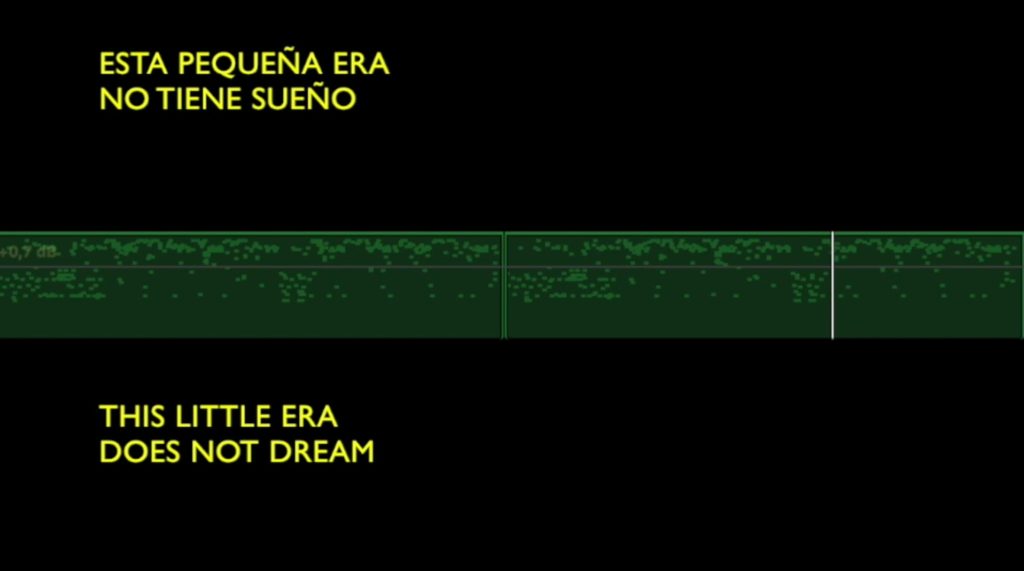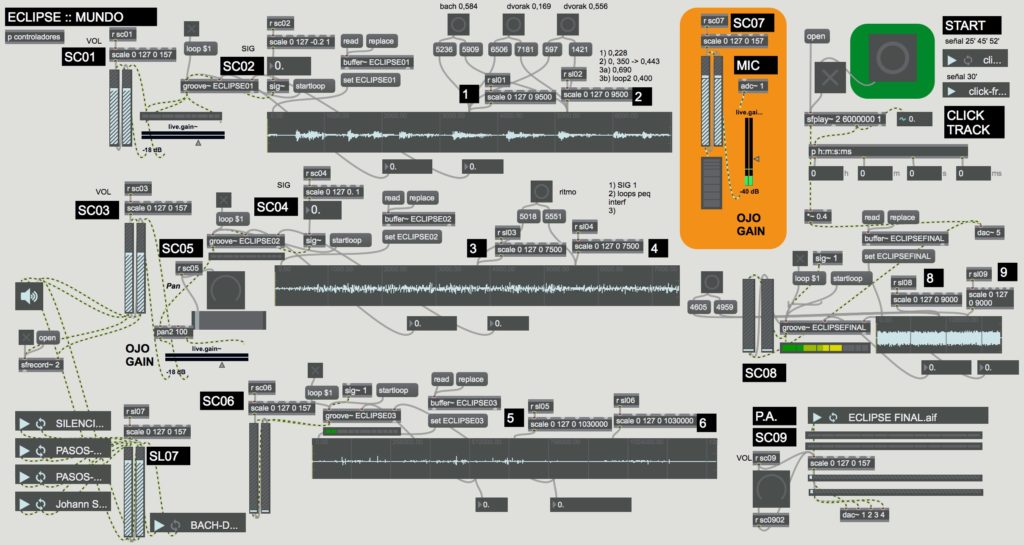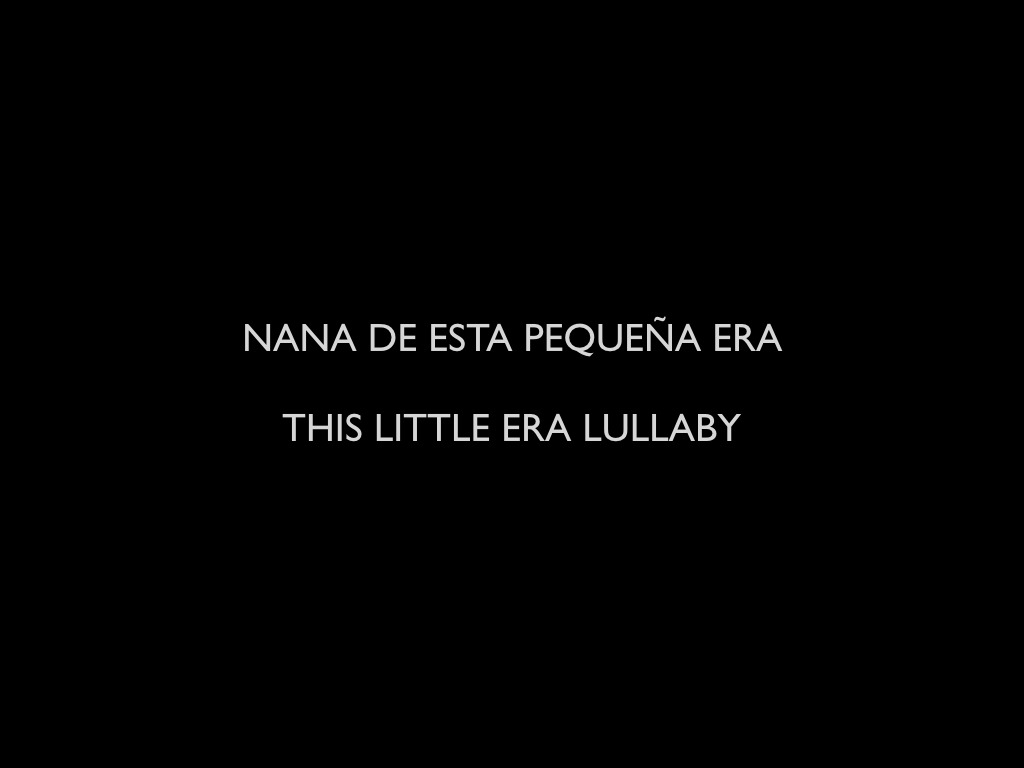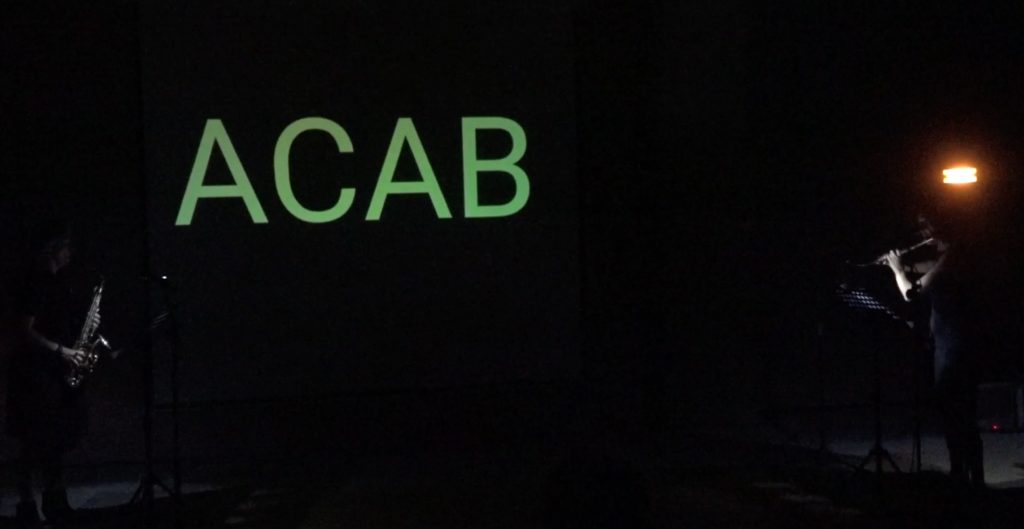Auditorio Conde Duque (Madrid) // 2 de febrero de 2021 // 20.30

https://www.condeduquemadrid.es/actividades/jinete-ultimo-reino-frag-2
Auditorio Conde Duque (Madrid) // 2 de febrero de 2021 // 20.30

https://www.condeduquemadrid.es/actividades/jinete-ultimo-reino-frag-2

“Nana de esta pequeña era / This little era lullaby” is an audiotext produced in 2019 from a rewriting of the lyrics and music of Lorca & La Argentinita’s 1931 recording of the popular “Nana de Sevilla”. Lullabies tend to name a monster (el coco) or a terrifying danger to warn babies to protect themselves. When the listener begins to drift into sleep, the singer progressively omits words until the song disappears. The ideal lullaby, Lorca said, would be the one built with only two notes. This lullaby for a deeply damaged world was created in the context of the project “Cancionero de la guerra social contemporánea / Songs for the contemporary social war” (Pedro G. Romero based on Guy Debord). (Headphones recommended).
https://www.internationaleonline.org/
*you have to activate the audio at the bottom right of the screen (play sound)
* we highly recommend the use of headphones
* if you want to start the video again from the beginning you have to update the page (this player has no play/stop option
* the lullaby is broadcast only between 8h and 14h CET, and between 18h and 24h CET. The rest of the day they present the beautiful piece How to prepare for a hurricane, pt 2 (2019) by Quinsy Gario.
“Nana de esta pequeña era / This little era lullaby” es un audiotexto producido en 2019 sobre una reescritura de la letra y la música de la canción popular “Nana de Sevilla” grabada por Lorca y La Argentinita en 1931. Las nanas suelen usar el nombre de un monstruo (el coco) o un peligro terrorífico para advertir a los bebés de que se protejan. Cuando quien escucha comienza a sumergirse en el sueño, quien canta va progresivamente omitiendo las palabras hasta que la canción desaparece. La nana ideal, dijo Lorca, sería aquella construida con sólo dos notas. Hicimos esta nana para un mundo profundamente dañado en el marco del proyecto “Cancionero de la guerra social contemporánea / Songs for the contemporary social war” (Pedro G Romero basado en Guy Debord). (Escucha con auriculares recomendada).
https://www.internationaleonline.org/
*hay que activar el audio en la esquina inferior derecha del visor donde dice «play sound»
*recomendamos usar cascos
* si quieres volver a empezar la reproducción desde el principio tienes que actualizar la página en el navegador (este reproductor no tiene opción de play/stop )
*la Nana se emite solo entre las 8h y las 14h CET, y entre las 18h y las 24h CET. El resto de horas del día se emite un vídeo precioso llamado How to prepare for a hurricane, pt 2 (2019) de Quinsy Gario.
«The decline of choreography and its movement: a body’s (path)way» web/archivo de la investigación de la coreógrafa Paz Rojo, en el que se inserta la obra Eclipse:Mundo.

Cabeza de Vaca en la Central Lechera (Cádiz)
http://laciudad.cadiz.es/tdc_detalles_agenda.asp?ID_EVENTO=53909
TEATRO CAMPOS ANTZOKIA (SALA CÚPULA ARETOA)·BILBAO
19 OCTUBRE (21:00)· FESTIVAL BAD ·
http://badbilbao.eus/web/bad-2019/espectaculos/cabeza-de-vaca-jinete-ultimo-reino-frg-3/

Nana de esta pequeña era // This little era lullaby //
María Salgado y Fran MM Cabeza de Vaca, 2019
After tracing Debord’s “Nana de la Zarzuela” (Zarzuela Lullaby), a 1981 remake of Lorca & La Argentinita’s 1931 recording of the popular “Nana de Sevilla” (Seville Lullaby), we brought to our present a lullaby for a deeply damaged sociopolitical context. Lullabies tend to name a monster (el coco) or a terrifyng danger to warn babies to protect themselves. When the listener begins to drift into sleep, the singer progressively omits words until the song dissapears. The ideal lullaby, Lorca said, would be the one built with only two notes.
Pedro G. Romero based on Guy Debord, with María Salgado / Fran MM Cabeza de Vaca, Niño de Elche / Los Planetas / Andrés Duque, Julio Jara, Tomás de Perrate / Proyecto Lorca / María Marín, Javiera de la Fuente / José Ismael Sierra and Bettina Flatter
Canciones de la Guerra Social Contemporánea (Songs of the Contemporary Social War), 2019
Performances;
Video compilation, recordings, songbooks, documentation
Presented at KODE 1 Permanenten / Cabinet
In the late 1970s, Guy Debord made frequent trips around the Iberian Peninsula. In Spain and France, with Miguel Amorós and Jaime Semprún, he was in contact with the Autonomist movement, under names such as Los Incontrolados and Unos Iconoclasistas. It was in this context that he decided to put together a songbook of what he euphemistically described as the ‘Spanish neo-democracy’. Needless to say, Debord was thinking of the songs of the civil war he sang by heart, of the popular songs compiled by Federico García Lorca and sung by La Argentinita, and of his relationship with the left-wing exiled Spanish, Latin American and European singer-songwriters living in Paris. In 1968, Debord had already made a version of the popular song ‘¡Ay Carmela!’, in French, adapting it to reflect the Stalinist repression of the CNT and POUM on the streets of Barcelona in May 1937. Debord published his first compilation in a booklet entitled Canciones de la Guerra Social Contemporánea (Songs of the Contemporary Social War) in 1981, attributing authorship to ‘Unos Iconoclastas’. He also tried to organise an initial recording in support of the members of the Autonomist groups imprisoned in Segovia, with Mara Jerez and her ‘ flamenco boys’ and a combo in the spirit of Paco Ibañez. But neither the underground Automonist organisations nor Mara Jerez embraced the idea. Debord explored the utopian idea of Spanish or Iberian identity, and what he had at some stage called the ‘new Babylonians’: Roma, flamenco artists, anarchists, exiles and workers, singing their defeats.
Canciones de la Guerra Social Contemporánea (Songs of the Contemporary Social War) is a project by Pedro G. Romero, who has been endeavouring to reconstruct and put into circulation the songbook assembled by Debord under that title. Twenty-seven songs are presented in different ways – in compilations, concerts, performative presentations and grouped together with informational material. Aside from the artists present in Bergen, artists contributing to the project include: Kiko Veneno, Maria Arnal, Christina Rosenvinge, Lorena Álvarez, Maialem Lujambo, Rocio Márquez and Rosalia.

ALESSANDRA ROMBOLÀ, flauta | XELO GINER, saxofón
**
VIE13· SEPTIEMBRE/19 · 21:00h· Museo Vostell Malpartida | Cáceres
++
Katharina Rosenberger (1971)
Miroir, para flauta y saxofón soprano ** (2007)
Daniela Terranova (1977)
Breathing Rust and Clouds, para flauta sola (2019)
Inés Badalo (1989)
Dé-coll/age, para saxofón alto solo, movimiento y voz * (2019)
Diana Rotaru (1981)
Meanders, para flauta baja y saxo alto * (2009)
Alessandra Rombolà (1973) / Ingar Zach (1971)
The Ring, para flauta bajo/flautín y electrónica
Sarah Nemtsov (1980)
Interludium, para saxofón soprano y electrónica ** (2007)
Fran MM Cabeza de Vaca (1976) / María Salgado (1984)
ACAB un lied, para flauta, saxofón, electrónica y vídeo (2018)